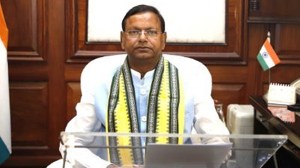Between Tel Aviv, Tehran
India8217;s done a fine job of balancing ties in West Asia. Why wreck it?

At the height of Operation Parakram in June 2002, with the country8217;s political and military leadership steeling itself for what appeared an inevitable conflict with Pakistan, following the attack on Parliament and the Kaluchak massacre in Jammu and Kashmir, the Indian Air Force top brass told the defence ministry that it needed supplies. If June 14 was the likely date for war, the air force needed to replenish its stock of spare parts and precision-guided missiles urgently. The Russians, their usual source, were unable to manage the order at such short notice, and so Tel Aviv was contacted. The Israelis8217; discretion was matched by their promptness: they quietly sent their defence secretary to New Delhi to assess the air force8217;s requirements on June 5 and three planeloads of weapon supplies landed at Palam the same week. This wasn8217;t the first time 8212; during the 1999 Kargil war, too, the Israelis rushed critical supplies to cater to last-minute Indian military demands.
For the Left parties, this may only substantiate their theory that the NDA government formed a security and military alliance with Israel, and cause them to increase their pressure on the UPA regime to 8220;disentangle8221; New Delhi from some evil axis with Israel and America in order to 8220;resume8221; the fight for justice for the Palestinian people. That attitude, however, is misguided, and rests on an insufficiently realistic view of international relations.
All friends are not allies, all allies are not friends, and all the rest are not necessarily enemies.
An overly simplistic view glosses over important facts: that, for example, Israel was one of only two West Asian countries to condemn the December 13 terrorist attack on Parliament. Interestingly, the other was Syria, with which Israel is still technically at war. Then again, regardless of its special relationship with Israel, India continues to pursue diplomatic relations with Iran; and, when the expected resolutions about Palestine come up at the UN, India votes in sympathy for their cause repeatedly, despite repeated concerns expressed bilaterally by Israel 8212; just as the OIC repeatedly votes against the Indian stance when the equally routine resolutions on Kashmir come up at their meetings. Further, although the Left credits L.K. Advani for close ties with Tel Aviv, it was actually Rajiv Gandhi and then Narasimha Rao who first normalised relations with Israel after Moshe Dayan8217;s secret 1978 mission failed.
This is not to claim that India no longer has a duty to the Palestinian people; but when foreign policy is central to India8217;s national interests, it cannot afford to be exclusively idealistic. Pakistan realises this. Witness President Pervez Musharraf8217;s well-received address to the American Jewish Congress or the meeting of Pakistani and Israeli foreign ministers in Turkey in September 2005. Indeed, Turkey, predominantly Muslim and ruled by moderate Islamists, seems to maintain good relations with Arabs and Israelis alike. Its military holds joint military exercises with the Israel Defence Force and its diplomats are currently facilitating indirect negotiations between Tel Aviv and Damascus.
In any case, engagement with Israel cannot be rationally rolled back. Israel8217;s economy is structured perfectly to meet India8217;s requirements as a trading partner. It has the highest number of patents per capita in the world and the largest number of start-up companies after the United States. India-Israel trade now stands at 3.3 billion: more than 30 per cent of Indian defence imports come from Israel. According to Defence Minister A.K. Antony, New Delhi purchased 5 billion worth of hardware in a five-year period up to 2006. Any disengagement, besides, runs the risk of alienating valuable allies on Capitol Hill.
The problem is not exclusively with the Left. The UPA government itself is rather squeamish about its relationship with Israel. The Manmohan Singh government pushed the bilateral relationship to subterranean levels. It has virtually ended high-level political engagement 8212; Agriculture Minister Sharad Pawar is the senior-most minister in the current administration to have made an official visit to Tel Aviv.
Even defence purchases have been under scrutiny, following the CBI investigation of the Barak missile deal. This is a severe problem. Regardless of the Defence Research and Development Organisation8217;s claims, indigenous defence capability is not sufficient to reproduce the much-needed equipment that Israel provides. From sensors that counter infiltration on the Line of Control all the way up to research on developing an anti-ballistic missile shield, Israeli companies play a key role in India8217;s defence. This September, Israel delivers the first of three PHALCON advanced airborne warning platforms to India, which the air force will mount on a Russian IL-76 aircraft. When complemented with a mid-air refuelling capability, the PHALCON system will lead to a manifold enhancement of Indian strategic reach. Any 8220;disentanglement8221; would mean that the armed forces would be at the mercy of erratic Russian hardware suppliers, who are more than ready to extract their pound of flesh 8212; and always open to pressure from China. The Left would do well to remember that Beijing would love to be in New Delhi8217;s position: in 2000, the Chinese made extraordinary efforts to buy the early warning systems from Israel, but the US did not let the sale go through.
It is time for the UPA to stand up and at least try to insulate international diplomacy, whether it is with Israel, Iran, the US or China, from domestic political discourse. After all, both Russia and China are assiduously engaging Tel Aviv without any political furore on the domestic front. Constant political noise and commotion over foreign policy sends a confusing signal to the global community about the administration8217;s intentions and capabilities. One hopes that the UPA does not let the Left do to Israel-India relations what it did to the nuclear deal.
shishir.guptaexpressindia.com
- 01
- 02
- 03
- 04
- 05































